I've actually seen a couple high-ranking Virginia Democrats argue that Tuesday wasn't so bad, that to say it was a disaster is an overreaction or whatever. For instance, DPVA Chair Dwight Jones sent out a Panglossian email which actually asserted, with no apparent irony or self awareness, "Today is a good day for Virginia Democrats" (in what conceivable universe, parallel or otherwise, would that be the case?!?), that we had "so many great races and Democrats made the party proud, regardless of the outcome" (uhhh...examples of "great races" please?) and that "as we saw in our races, when the party is able to effectively communicate with its base, Democrats win" (actually, what we saw was the opposite - when Democrats disrespect/ignore the base, run away from/fail to tout their own accomplishments, adopt Republican framing, offer no comprehensive econoimc vision for the future, play the false equivalency/"both sides" game, etc., etc, they get their butts kicked). To this utterly delusional "thinking," I present this article.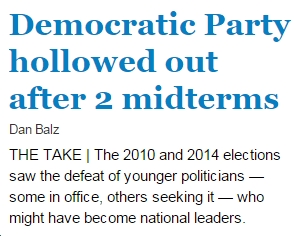 A couple choice quotes: *"The more serious problem for Democrats is the drubbing they've taken in the states, the breeding ground for future national talent and for policy experimentation. Republicans have unified control - the governorship and the legislature - in 23 states, according to the National Conference of State Legislatures. Democrats control just seven. Democrats hold 18 governorships, but only a handful are in the most populous states." *"Without prominent statewide elected leaders, Democrats are in danger of seeing their state party structures atrophy. This has happened in Texas over the past two decades, ever since Republicans seized control of the politics of the state." Think about it, both nationally and right here in Virginia. For instance, in 2009 and 2011, Virginia Democrats were wiped out in the House of Delegates, dropping from 44 to 32 seats, and losing a bunch of really good people (e.g., Margie Vanderhye lost to...yep, Barbara Comstock; Chuck Caputo lost to Jim LeMunyon; Joe Bouchard lost to Chris Stolle). Today, we remain basically decimated in the House of Delegates, while Republicans like Barbara Comstock are on their way to Congress. ugh. In 2010, we lost rising star Tom Perriello. In 2013, we managed to pick up a net of ZERO House of Delegates seats, again leaving us decimated in that chamber. So much for our "farm team." Same thing nationally, sad to say. So how was this past Tuesday anything but an unmitigated disaster? Got me. |
For any Democrat delusional enough to think Tuesday wasn't a disaster
Saturday, November 8, 2014
Actually, No Sen. Warner, Voters Sent the Exact Opposite Message...or No Clear Message at All
Friday, November 7, 2014
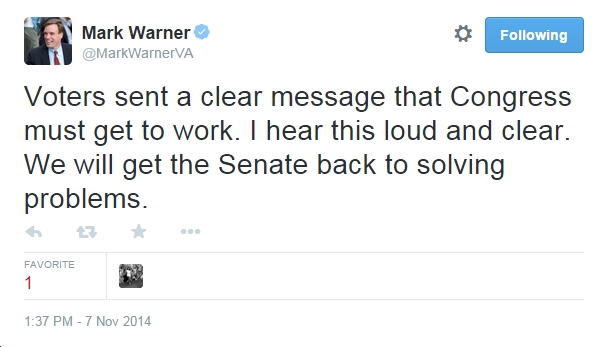 According to Sen. Mark Warner, now officially reelected with Ed Gillespie's concession a few minutes ago, this is the message voters sent a few days ago: "Congress must get to work." But is that really the case? A few points.1. There's really no way to know exactly what "message" voters were sending earlier this week. Exit polls indicated that this electorate was mostly concerned about the economy, but there was no specific course of action recommended. Clearly, voters are upset, anxious, angry, frustrated, etc., but again, no clear signs of where they want to go. According to Sen. Mark Warner, now officially reelected with Ed Gillespie's concession a few minutes ago, this is the message voters sent a few days ago: "Congress must get to work." But is that really the case? A few points.1. There's really no way to know exactly what "message" voters were sending earlier this week. Exit polls indicated that this electorate was mostly concerned about the economy, but there was no specific course of action recommended. Clearly, voters are upset, anxious, angry, frustrated, etc., but again, no clear signs of where they want to go.2. To the extent we can glean a "message" from the candidates voters elected on Tuesday, clearly the "message" would be that they want MORE of what the Republican Party has offered the past few years. That would be, in no particular order: shutting down the government, threatening to default on the national debt, refusing to compromise on anything, working 24/7 to make President Obama "fail," opposing anything proposed by Dems even if they were originally Republican/conservative ideas (e.g., cap and trade, Obamacare - formerly known as "Romneycare" or the 1993/94 "Republican alternative to Hillarycare"), denying science, trying to trash the environment, letting our infrastructure fall apart by not funding it, refusing to invest in America, refusing to compromise on ways to reduce the deficit/debt, imposing "brain-dead" (in Warner's own words) sequestration on the country, etc. 3. Warner only won this election by 16,000 votes, with historically low turnout of 37% in Virginia. Thus, to the extent "voters" sent a message, it's by a margin of under 1% of the 37% who showed up to vote. Last I checked, 1% of 37% was 0.37%. And if Ed Gillespie had gotten 16,001 more votes, what would the message from "voters" have been exactly? Totally different, or just 0.37% different, or what? Got me. 4. Of course, this is coming from the same guy who seriously believes that "the middle" is always the right answer. Let's try this like we're in math class. The "middle" of 0 and 10 is...yep, 5. the "middle" of 0 and 100 is...yep, 50. The "middle" of 0 and 1,000 is...yep, 500. Are those all the same answers? Obviously, not. Yet, according to Warner, they are all, by definition, the correct answers, because they are the "middle." And while that might be true mathematically, it's utterly nonsensical when it comes to society, politics, etc. Thus, if the correct answer used to be an exactly "middle" compromise between Dems at zero and Republicans at 10 (thus, 5 was the correct policy answer), after Republicans lurch to the far right, is 50 or 500 the correct policy answer, by definition? Does any of this make any sense whatsoever, other than being a political shtick Mark Warner has used for years now? If so, I can't figure it out, any more than Warner could in 2008 when I asked him three times, in different ways, to explain what "radical centrism" was exactly. No answer. 5. The bottom line is that a Congress filled with more people like Joni Ernst, Cory Gardner, Barbara Comstock, and Dave Brat is most certainly NOT more likely to get anything good done for the American people. Now, it IS more likely to get some seriously horrendous s*** done (just look at the winning Republican candidates' platforms - it's a nightmare of climate science denial, personhood, tax cuts for the rich, taking healthcare away from people, you name it). Given that, I'd say the best we can hope for is that Congress does NOT get stuff done, other than the basic functions of government, over the next two years. Because if it does, it will only be bad for America, for the middle class, for working people, for the environment, you name it. No thanks. |
Are Broadcast TV Political Ads a Huge Waste of Money? VA-10 as a Case Study.
Thursday, November 6, 2014
I’ve said for years that broadcast TV advertising, particularly in places like the expensive and fragmented DC Metro market, provide an extremely low “bang for the buck”/”return on investment” to Congressional candidates. Now we have some new numbers which illustrate my point: “More than $111 million has been spent on broadcast television ads for U.S. House candidates since Labor Day, but more than $80 million of that went to ads airing outside the candidates’ districts, according to data by Targeted Victory” (seeTargeted Victory’s analysis here). Yep, $80 million out of $111 million outright wasted. That’s a pathetically low “bang for the buck” by almost any metric. But wait, it gets worse!
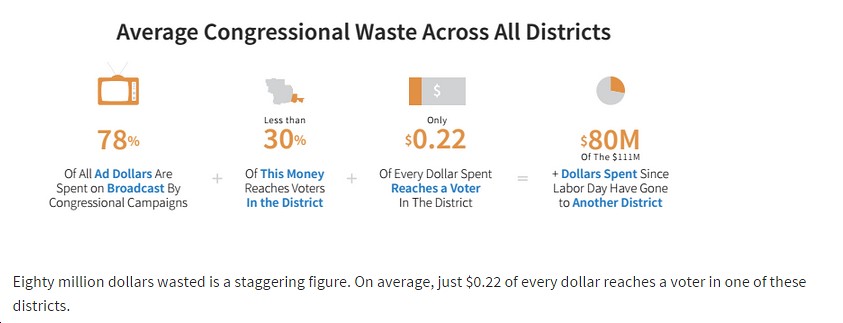
Take Virginia’s 10th CD for instance. If you run broadcast TV ads in the DC Metro market, it costs a fortune, but what percentage reach: a) areas outside the 10th CD; b) people in the 10th CD who aren’t likely voters? As for part a of this question, that’s easy. See this Designated Market Mapfor the DC area: in short, your broadcast TV ad will reach the eastern panhandle of West Virginia (not in the 10th CD), large swaths of Maryland (not in the 10th CD), DC (not in the 10th CD), Arlington (ditto), Alexandria (ditto), Fairfax County (mostly ditto), Prince William County (ditto), Stafford/Spotsylvania/etc. (ditto). All that money is TOTALLY WASTED. In the end, perhaps 1/7th (14%) or so of market reached by a broadcast TV ad in the DC Metro market reaches the 10th CD. That means 86% of a DC Metro market broadcast TV ad buy is essentially “bleed” — not reaching the targeted audience at all, ergo wasted.
Within the 10th CD, it’s important to point out that most people reached by a broadcast TV ad in a mid-term election like this will not be likely voters, let alone what you really want: likely AND persuadable voters in the district. The number of those people reached by your (super-expensive) ad? Miniscule. Bang for the buck? Less than miniscule. Of course, the ad also reached UNlikely voters who might be persuaded to vote, and I’m told that broadcast TV ads do “move the numbers,” but I haven’t seen any serious, controlled, scientific studies comparing: a) effectiveness of broadcast TV advertising in “moving the numbers” and b) effectiveness of other advertising techniques – radio, direct mail, print, social media/digital, etc. – in “moving the numbers.”
Anyway, just for fun, let’s say the 10th CD makes up 14% of the DC-area media market. Then, let’s assume 40% turnout of registered voters — or to put it another way, maybe 25% of the total district population. Then, let’s consider what percentage of that 25% are truly persuadable — 10%-20% perhaps? Multiply these numbers together and you end up spending a huge amount of money on TV to reach…what? Again, in fairness, those ads also will reach voters who might not even have known there was an election, or didn’t know anything about the candidates, or might not have been intending to vote but decided to after being barraged by TV ads. That’s hard to measure, but it certainly could increase the value of the broadcast TV ads. The question, by how much?
Anyway, the big question is why campaigns keep returning to the expensive, non-targeted broadcast TV advertising “well?” The question “cui bono” — “to whose benefit?” ) comes to mind. Think about it: who benefits from this huge expenditure of money? Obviously, it’s: a) the people who make and buy these ads; and b) the TV stations that are paid handsome sums to run them. The question is, does the candidate benefit, especially when one considers “opportunity cost” – could that money have been spent more efficiently, effecitvely, etc? I’m skeptical.
The sad reality, of course, is that there’s a ton of money sloshing around out there, looking for a home, in the campaign-advertising-industrial complex. Those people, with their strongly vested interest in seeing that money spent, are highly motivated to convince actual and potential candidates that their services are invaluable, that if the candidate only does what they the consultants tell the candidate to do, he/she can WIN WIN WIN! (getting excited yet? heh) And time and again, it works. Plus, of course, if campaign managers simply follow the script that “everyone” follows, it’s “safe” in the sense that if they lose, they can say they did what everyone said they should do. In short, it’s a great CYA move to follow the cookie-cutter model towards campaign management: raise a ton of money, save it up until the end, run scads of broadcast TV ads.
Is there an alternative to this model? In theory, of course there is. For instance, how about having the candidate, instead of spending all their time raising and spending money, do…other stuff? Yes, I realize it’s tough, given the absence of earned media, the collapse of newspaper coverage, etc. But theoretically, they COULD shift their resources to field and social/digital media, targeted radio and in-district cable TV, niche publications (e.g., Korean/Spanish/etc. language newspapers and radio stations), print advertising in local papers, stuff like that. That would be much less expensive, but would also be a gazillion times more focused locally, within the district, reducing the absurd “bleed” that’s inherent to broadcast TV advertising. As an added bonus, the candidate wouldn’t have to spend 8 hours a day or whatever on miserable “call time,” and could instead be out knocking doors, attending community events/festivals, doing interviews, studying up on policy issues and working on their presentation skills so they can kick butt in debates and other public forums, etc, etc.
Again, though, there’s a huge class of consultants out there who don’t get paid if the above model takes hold. Which is why they’ll tell you it’s crazy to change, that of COURSE you need broadcast TV ads, blah blah blah. Just one thing: when you’re considering whether or not you should believe these consultants, just keep one thing in mind that they have a super-strong vested financial/economic interest in persuading everyone that they’re right. So take their advice with the appropriately-sized grain (pillar?) of salt.
Graph: Mark Warner's 2014 Vote Total in Historical Perspective
The following are selected vote totals from non-presidential-election-year, statewide races in Virginia since 2001. Obviously, the state's population has grown a great deal since 2001 (e.g., 4.1 million registered voters in 2001, 5.4 million registered voters in 2012), so all else being equal, one would assume that the winning candidate would get more votes than they would have 13 years ago. Which makes it all the more striking that Mark Warner's campaign in 2014 managed to get just 1,069,451 votes in, essentially, a two-way race (Robert Sarvis got just 53,201 votes). That's lower than Terry McAuliffe got last year in a three-way race (in which Roberts Sarvis got 6.5% of the vote), lower than Jim Webb in the mid-term election of 2006 (Webb got 1,175,606 votes that year), also lower than George Allen in 2006 (he got 1,166,277), lower than Mark Herring in 2013 (Herring got 1,103,777, edging Mark Obenshain by just 165 votes), etc. What do I make of this? In short, it appears that Democratic voters were less motivated to turn out this Tuesday for Mark Warner than they were for McAuliffe/Northam/Herring last year and for Jim Webb in 2006. Why? That's a question I'm throwing out there, but it's hard for me to see how Warner worked to motivate the "base" (and remember, these mid-terms are "base elections") to turn out. Your thoughts? |
NY Times analysis: Virginia turnout dropped most in Democratic areas
According to an analysis by the New York Times: "Some weak Democratic performances in the midterm elections Tuesday are hard to explain. Virginia is not." So what happened in Virginia? Simple: turnout was way down, with the largest declines "in Democratic-leaning areas" (while "[t]urnout in Republican-leaning areas in Virginia was at levels fairly typical for a competitive midterm election"). Why? In large part, because Warner et al. assumed he had this one in the bag, therefore:In 2012, Democrats mounted significant mobilization and campaigning efforts in Virginia. They didn't in 2014. The surprisingly close race highlights why they're needed.You know the rest of the story... 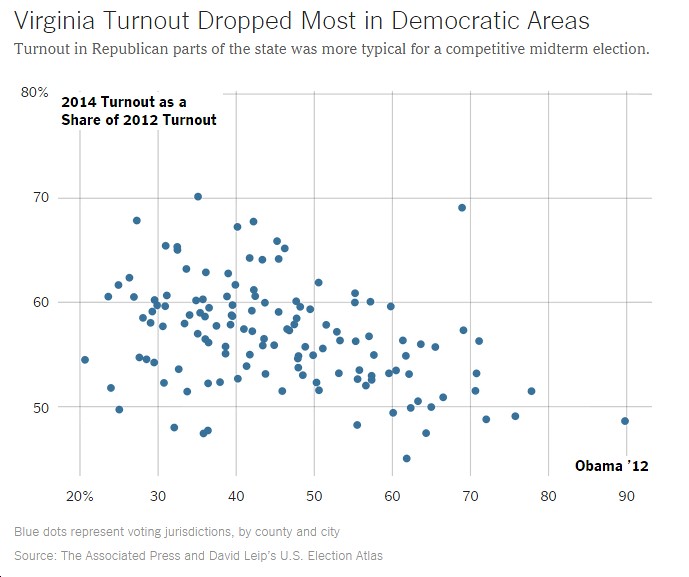 |
Winners and Losers: Virginia Election 2014 Edition
Wednesday, November 5, 2014
1. Ed Gillespie: Yes, he lost yesterday, but he was a huge winner nonetheless. At the start of this, would ANYONE have thought that Gillespie could have almost defeated Mark Warner? Seriously? No, of course not. Which means that Gillespie has now gone from being a DC lobbyist and operative (aka, "hack") to a potential powerhouse in Virginia Republican politics, whether that's a 2017 run for governor or whatever. 2. Ed Gillespie's campaign; manager Chris Leavitt; digital director Eric Wilson; Communications Director Paul Logan; etc.: I was impressed, not with the substance of course (typical Republican policies, pretty much), but with the energy, apparently enjoyment of the campaign, smart strategy (e.g., pounding Warner on the contrast between his "radical centrist" image and his actual voting record was super smart, even if misleading and oversimplified; hitting him on the Phil Puckett scandal was audacious coming from "Enron Ed," but also smart). Gillespie's campaign seemed to outhustle the Warner campaign at every turn, including on social media, where they were far more active, creative, energetic, you name it. With a bit more money, it's quite possible that Gillespie could have won last night. Amazing. 3. Barbara Comstock's campaign: I'm obviously not a fan of Comstock's, but her campaign did a great job pounding Foust (and not letting him get up off the mat) on his "real job" gaffe. Also, it's annoying, but it was probably smart for Comstock to avoid the media, given that she almost certainly knew she had a big lead. Other than that, she ran a generally disciplined, professional campaign, with a candidate who was forceful, articulate, etc. Sure, she was wrong on all the issues, plus she lied about who (or why) she voted for in the 2008 Virginia Democratic primary, but you didn't really expect the "liberal media" (yeah right!) to call her out on that did you now, as Chuck Todd did to Alison Grimes? :) 4. Peter Rousselot: I disagree with him on the streetcar, and I disagree with his support for John Vihstadt, but no question he helped put that winning operation together and run it successfully. Whatever else you might think of Peter, there's no doubt he's a super-sharp guy and dangerous (if you're on the opposing side) political operative. 5. Libby Garvey: Again, I strongly disagree with her on the streetcar, but she now just needs one more ally on the Arlington County Board - which she quite possibly could get in next November's elections - and she'll be in the "majority" on the streetcar, and possibly other issues as well. 6. Tim Kaine: If there was any doubt which Virginia U.S. Senator is the front runner for the 2016 presidential running mate, there isn't anymore. I mean, I always assumed Kaine was a better fit for likely nominee Hillary Clinton's ticket anyway, but Warner's razor-thin escape from political death last night should clinch it, especially when one considers that Kaine beat George Allen in 2012 by 6 points. 7. Ben Tribbett: He doesn't have a blog anymore, but his coverage on Twitter (which, by the way, is essential if you're in the least bit serious about politics) last night of the Warner-Gillespie race was far, far better (more astute, accurate, you name it) than the laughable coverage on places like CNN (Clueless Nincompoops Network?). For instance, Ben tweeted last night, "John King said Virginia Beach is a Dem stronghold again. Someone at CNN get ahold of him, he is looking like a complete fool." Yep. Also, as a national journalist pointed out to me, Ben was "out there weeks ago, saying the Virginia Senate race was not a foregone conclusion...he quickly looked at the data and was spot on throughout the evening, as he always is." 8. Widows and widowers of servicemembers: Most definitely deserved. 9. Bob Goodlatte: With Eric Cantor and Frank Wolf gone, he now becomes the most powerful member of the Virginia House delegation. |
| lowkell :: Winners and Losers: Virginia Election 2014 Edition |
| Mixed 1. Mark Obenshain: On the one hand, his relatively clear path to the 2017 nomination is now pretty much gone (assuming Gillespie decides to go for it). On the other hand, Obenshain could run again for Attorney General, this time with someone not nicknamed (for good reason) Ken KOOKinelli at the top of the ticket. Of course, Obenshain will still have to deal with his own extreme views, such as wanting to criminalize miscarriages. But still, I could see him better off running on, let's say an Ed Gillespie/Pete Snyder/Mark Obenshain ticket in 2017 than with himself at the top of the ticket (and god knows who for LG and AG). 2. Robert Sarvis: He ran again, he did much worse than last year, but he may have gotten just enough votes (2.4%) to help Mark Warner defeat Ed Gillespie. For that, Democrats all thank him. :)Losers 1. The Warner campaign: I personally like the people who ran Mark Warner's campaign, but to be blunt...what on earth were they doing? As one Virginia Democratic politico put it to me this morning, "the mechanics of the campaign were, at best, weak...very weak and flat...no energy; didn't dot every 'i' and cross every 't'; it was like there was no campaign, no exhortations to activists, nothing." I agree. During much of this campaign, I kept thinking that at some point the Warner folks would wake up, but they never really did. For instance, why on earth was Ed Gillespie kicking the Warner campaign's butt on social media? Why didn't the Warner campaign even have a social media team, like Tim Kaine did in 2012 (and every competent campaign nowadays HAS to have, pretty much)? Why did the Gillespie folks seem to have a lot more signs everywhere? What on earth was the Warner campaign's messaging exactly, particularly with regard to firing up "the base" (given that this was, after all, almost 100% a "base election)? Why were there never strong, crisp answers to criticisms of Warner on his voting record ("97% with Obama"), the Phil Puckett mess, etc? Why would Warner do stuff like come to Arlington and brag about working with the hated (by the Democratic base) Darrell Issa? I could go on and on, but that would take all day. Just a bafflingly lame, lethargic campaign all the way around, and it almost cost Warner reelection in the end. (P.S. I just saw that Ben Tribbett posted, "I attended over 50 Dem events in NOVA after labor day and never saw a Warner senior staffer at any of them. Totally out of touch." Ouch.) 2. Warner's "radical centrism" shtick. I asked him in 2008 what this meant, and he either couldn't or wouldn't answer. To this day, I doubt Warner could really explain what that means, other than dissing the base constantly (e.g., comparing MoveOn to the Tea Party, mocking environmentalists and clean energy advocates) and partnering with the likes of Issa, etc. Anyway, yesterday should prove that there's no political upside from trashing your "brand," running away from your president and party, constantly pushing Republican framing and "false equivalence" nonsense, etc. Also, so much for Warner's supposedly unique appeal in rural Virginia or to being some sort of post-partisan figure in this era of the Tea Party, and the hard-right Republican Party. 3. John Foust's campaign: As lethargic and lame as the Warner campaign was, it's hard to even know where to start with John Foust's abysmal campaign. I guess we can start with the candidate, who is a good guy, but clearly wayyyy out of his league (in terms of knowledge of national/international issues, ability to articulate...well, anything, etc.) running for Congress. As for the campaign, why didn't they quickly and forcefully respond to the "real job" gaffe at the time? (note: this is NOT "Monday morning quarterbacking," as I had numerous conversations at the time on this very point, predicting that the Comstock folks would pound him on this until the end...and I was right) In the end, that's exactly what happened, and it was a killer. I also don't understand why there was never a strong, cohesive response to attacks on John's wife for supposedly not accepting Medicaid patients? It's not like they didn't know this line of attack was coming. Meanwhile, the campaign didn't even TRY to define Comstock early, like last winter/spring, both by seriously "tracking" her during session and also by relentlessly hitting her for her far-right-wing extremist endorsements (by the likes of Sean Hannity, Mark Levin, etc.). Remember, the "field" was cleared for Foust, while Comstock was bogged down in Richmond and then in a Republican contest for the nomination, opening up a clear shot for Foust to try to define her in the minds of voters. True, they didn't have a lot of money at that point, but they certainly could have/should have used social media and "earned media" to do so. Why didn't they? Got me. Speaking of money, was this the most cookie-cutter, uncreative, paint-by-numbers campaigns ever? I can just hear the DC consultants now: John, you need to spend the next 9 months on the phone 8 hours a day asking for money, so that at the end we can go on broadcast TV. Stupid. Stupid. Stupid. Did I mention "stupid?" Why? Because that strategy doesn't work. Another example of someone who mostly stuck to that script? Judy Feder in 2006, who ended up with approximately the same percentage (41%) that John Foust got last night. Except that Feder was running against popular incumbent Frank Wolf, while Foust was running for an open seat, in a district that went for Romney by 1 point in 2012 (yet Foust lost by 16!!! points). For 2016, it's time for a brand new candidate (paging Jennifer Wexton?) and a completely new campaign in Virginia's 10th CD. 3a. The Foust email campaign: This one deserves its own separate mention, as it was SO awful, embarrassing, pathetic, derisive-laughter-inducing, you name it. I mean, seriously, who comes up with this ridiculous, apocalyptic language day after day (e.g., "This is as bad as it gets: if we don't have the resources to fight back, our chances of winning will drop to ZERO.")? Perhaps the worst of all came on November 2, touting absurd YouGov "poll" results showing a generic Democrat in the 10th CD supposedly down two points. The email language? "A brand new poll shows Democrats trailing Republicans by just 1 point in Virginia's 10th district," so donate $5 ("Need 1 donation from 22201"). I mean, the whole thing's idiotic, including the "ask" - were they really saying they only needed ONE donation of $5 from the 22201 zip code? And yes, I know the rejoinder to criticisms of these degrading, smarmy emails is that "they work." But does anyone really KNOW that? You mean, if they sent out normal, hard-hitting emails they'd raise so much less money than with these monstrosities? And even if normal emails raise a bit less money, is it really worth it to send out, under the candidate's own name, such degrading trash? I vote "no." How about you? 4. Arlington Democratic establishment: Such a huge "fail," it's hard to know where to begin. But let's start at the inaptly named "victory party" last April, after Democrat Alan Howze lost the special County Board election to Republican John Vihstadt. Ben Tribbett and I got into an...er, "discussion" with a senior Arlington Democratic elected regarding his contention that Howze would win easily in November because Mark Warner would be on the ballot, etc. Ben and I practically bit the poor guy's head off, but the point is, as Ben put it: "What [senior Arlington Dem at the April "victory party"] said is what all the county board members said also -- basically...[that] the electorate in November is bigger and less informed and will do whatever is on the Democratic sample ballot...They insulted their own voters in what might be the best educated electorate in the world, and their voters came out and b**** slapped the f*** out of them." I'd simply add that to assume you're going to win an election is never smart, and to fail to listen to the message voters send you is also never smart (not to mention that it plays into the image of you as "arrogant, insular, and non-communicative"). Did the Arlington Democratic establishment do that after the April special election loss? Maybe a bit, but clearly not enough. Meanwhile, as someone who volunteered yesterday to hand out sample ballots at the polls, clearly that did not work. Nor did the idea that Mark Warner's "coattails" would carry Howze to victory. In the end, Mark Warner got 47,643 votes in Arlington yesterday, while Alan Howze received 27,447 votes. That's not a "dropoff," that's the Grand Freakin' Canyon. Does anyone in the Arlington Democratic establishment have any clue why that happened or what to do about it? Uhhhhhhhh. 5. Alan Howze campaign: Not sure what they were doing all summer, but I did hear a lot of crickets quietly chirping away. Where was the passion, where was the energy, where was the willigness to take some risks/distance Alan from the unpopular County Board, etc.? Got me. It's sad, because Alan is a really good guy both personally and on policy matters. He would have made a solid County Board member. But now, after losing in 2009 for House of Delegates, and now twice in 2014 for County Board, it's hard to see a future political career for Howze. Sigh... 6. The Columbia Pike Streetcar: On the one hand, the streetcar project is funded (mostly by state and regional money, plus a dedicated tax on businesses along the Pike), and has all the economic arguments on its side (e.g., it will bring in billions of dollars in investment and far more than pay for itself), it's obviously not popular. The question is, with John Vihstadt now reelected, and with the prospect of either/both pro-streetcar County Board members up for relection next year (Mary Hynes and Walter Tejada) being seriously challenged, it's not looking good for this project. It's very unfortunate, because this would be a great thing for Arlington (and I'm a strong supporter), but if yesterday wasn't a message sent by voters (who massively split their votes -- for Warner, Beyer...and Vihstadt), I'm not sure what was. 7. The pro-streetcar effort to date: What pro-streetcar effort to date? The anti-streetcar effort has run circles around it, kind of like a Maserati racing around a streetcar picking up passengers or whatever. Why on earth is that? For my part, I've been telling them for a couple years now that they needed to ramp it up BIG TIME, but they didn't. Ugh. 8. Jack Trammell campaign: It was always going to be seriously uphill in the "red" 7th CD, but if Trammell had ANY chance, at least to make it close, his campaign completely blew it. Coming out of the Brat upset of Cantor, there was a moment when Trammell was getting a lot of attention, people were flocking to his Facebook page, etc. Did his campaign take advantage of that momentum? Nope. Instead, weeks/months went by with pretty much dead air. Also, instead of pounding Brat as the Ayn Rand-worshipping extremist he truly is, Trammell by all accounts decided to run a campaign that barely mentioned Brat at all (for his part, Brat certainly took some hard shots at Trammell). Over the past few months, I heard tons of stories about the Trammell campaign, none of them flattering. I also watched as Trammell passed up opportunity after opportunity to go after Brat, to launch an aggressive defense of Democratic values, etc. And the result was...Brat 61%-Trammell 37%, which is 7 points worse than Wayne Powell did against Eric Cantor in 2012 (58%-41%). Great, huh? 9. YouGov "polling": On 10/30, this outfit released "polling" data on every House race in the country. I put "polling" in quotes because the results were utterly laughable. For instance, here in Virginia, YouGov had Rep. Randy Forbes tied, 48%-48%, with an unfunded, unknown opponent. They had Rep. Gerry Connolly winning by 27 points (he actually won by 16 points). And they had John Foust trailing 42%-40% to Barbara Comstock (actual result: Foust lost by 16 points). They also badly missed a bunch of other races, including Virginia, where they had Warner up 10 points over Gillespie from "polling" done Oct. 16-23. Seriously, hang it up guys, or just switch to throwing darts at a dartboard or whatever. 10. Virginia/All of us: The next two years are going to be a complete cluster@#$#@$ with a bunch of conspiracy theorists, climate science deniers, etc. coming in to the House and Senate. Just a nightmare, the exact opposite direction our country needs to be going. 11. Virginia General Assembly: Specifically, for not funding upgrades to the State Board of Elections, which was a debacle last night - down most of the night, super slow, faulty data, etc, etc. This SHOULD be unacceptable, but of course Bill "ALEC" Howell and company have other priorities, like doing whatever their corporate masters tell them to do. 12. Suzanne Patrick campaign: How you manage to take a strong resume like Patrick's and turn it into a 17.8-point loss in a "plus 2" Republican district is beyond me. But they did it, so as Chris Cillizza likes to say, "Congrats...or something." Heh. 13. Broadcast TV advertising: I'll have more on this, but can anyone seriously claim to me that John Foust or Mark Warner did better than they would have because the spent millions of dollars on wildly inefficient, super-low "bang-for-the-buck" broadcast TV advertising? If so, I'd love to see the data backing it up, specifically explaining how that money and time raising the money couldn't have been better spent doing other things. P.S. One more loser we could add would be the media, but what else is new? Probably the low point was the Post's non-endorsement of John Foust, but overall the coverage of the 10th CD race exhibited the usual flaws of the media these days: sporadic, thin, false equivalency/"both sides" reporting, focus on sensationalism rather than substance, etc. |
Steven Pearlstein Nails It on Democrats' "failure of brand management"
Sunday, November 2, 2014
Is this the party that fights for the poor? working people? the middle class? the environment? civil liberties? economic fairness and social justice (to quote one of Jim Webb's favorite phrases)? universal health care? If so, you'd barely know it the past couple decades, particularly starting in 1994, when Dick Morris, the "third way," "triangulation," and "the era of big government is over" became staples of the Clinton White House following the Gingrich/"Contract with America" landslide in 1994. |
How is Mark Warner's Brand Faring? Areas to Watch on Election Night to Find Out.
by FreeDem
( - promoted by lowkell)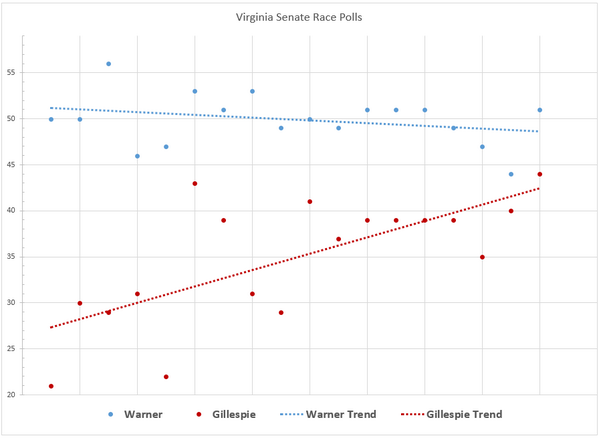 Since my series on Virginia politics back in December and January I've given up my Virginia roots, moved to the District of Columbia, and even find myself voting in a DC election! You can take me out of Virginia, but you can't take Virginia out of me. With Election Day just around the corner, I'm delurking to raise some questions about what we should expect from the Mark Warner victory on Tuesday ... Knock on wood!Despite my concerns about jinxing the election, a Mark Warner defeat on Election Day is the furthest thing from the realm of plausibility. Consider this trend line of polling in the Virginia Senate race tweeted earlier this week by Speaker Howell's spokesman, Matthew Moran. Since my series on Virginia politics back in December and January I've given up my Virginia roots, moved to the District of Columbia, and even find myself voting in a DC election! You can take me out of Virginia, but you can't take Virginia out of me. With Election Day just around the corner, I'm delurking to raise some questions about what we should expect from the Mark Warner victory on Tuesday ... Knock on wood!Despite my concerns about jinxing the election, a Mark Warner defeat on Election Day is the furthest thing from the realm of plausibility. Consider this trend line of polling in the Virginia Senate race tweeted earlier this week by Speaker Howell's spokesman, Matthew Moran.I fully expect Warner to win on Tuesday, but I think we should be prepared for a closer than expected victory. Libertarian Robert Sarvis was hoping to build on his surprisingly strong showing from 2013, but he will be lucky to hit 2% this time around. I would not be surprised by a Warner margin of victory of 5 to 6 percent, far closer than earlier polls showing him up by over 20 percent. Warner has run a positive campaign based on his personal brand, playing up bipartisan support from that other Senator Warner and reminding Southwest Virginia of his work bringing Virginia Tech into the ACC. The polls show we won't have the same "Warner Country" that turned out for Mark almost two to one from 2008. One of the constant themes from my Christmas series was that the Democratic Party of Virginia needs to prioritize competitive races based on the underlying Democratic lean of the districts, not idealizing the magical appeal of candidates who can supposedly swim up stream against the partisan tides that have been moving rural Southwest and Southside Virginia into the Republican column. This year could be a good test of the personal appeal of Mark Warner in Southwest Virginia versus the "War on Coal" rhetoric in Republican attack ads. |
| FreeDem :: How is Mark Warner's Brand Faring? Areas to Watch on Election Night to Find Out. |
| Consider the low-turnout environment of 2014 with an electorate that is still favored to return Mark Warner to the Senate. In the same way that it is questionable to even consider districts that did not support Ralph Northam over the meltdown Tea Party candidacy of E. W. Jackson, how should we view districts that may have historically backed Democrats like Mark Warner in 2001 and 2008, but are shifting Republican even when he's on the ticket?Here are some areas to watch on Election Night to see how Mark Warner's brand is faring. 9th House of Delegates District (Franklin, Henry, Patrick Counties): In 2008, this was the second best district for crossover support for Warner (the 1st was the best district). Warner won 63% of the vote, 25% ahead of Obama's performance. When Republicans drew Ward Armstrong into the district, he put up a hell of a fight and ended up losing in 2011 by only 5 points. But in 2012, Obama dropped to 34%, down from 38%. But even that wasn't a floor for Democratic performance. Terry lost the district with only 29% of the vote, not even Northam could win the district. This is the sort of district that believers in a rural Virginia Democrat appeal would want to contest. How Warner performs on election day should give us a good indication if this will be possible. 12th House of Delegates District (Montgomery and Giles Counties, Radford City): Just how effective will Mark Warner's Virginia Tech ad strategy be in this Blacksburg based district? The district is well crafted (aka gerrymandered) challenge for Virginia Democrats. High turnout among the student population in presidential years makes the district look competitive, but in lower turnout years the more conservative electorate that turns out makes the district look more like the rest of Southwest Virginia. With polls showing increasing disillusion among Millennials about Obama's agenda, what will this district look like on Tuesday? 6th House of Delegates District (Wythe, Carroll, Smyth Counties): House Democrats in 2013 were shocked when they failed to win this seat, somehow believing this deep red district was about to elect a Democrat. That was political malpractice. Watch Warner's performance in this district to see if there's any grounds for believing a Democratic victory would ever be possible here. 14th (Danville City; Pittsylvania and Henry Counties) & 16th (Pittsylvania and Henry Counties; Martinsville City) House of Delegates Districts: The Republican "War on Coal" may resonant in Southwest Virginia, but these Danville and Pittsylvania County district will be a testing case of just how low Warner's brand can fall simply through association with Obama and the Democratic Party. Pittsylvania County is the bastion for Southside Republicans and will push Adams or another Pittsylvania Republican into the State Senate should Frank Ruff ever retire. The 14th District is a frustrating tale of low turnout in odd years when the African-American community is less engaged. The low turnout was a scare for Democrats in early on election night in 2013, with Terry far behind expected vote totals. And it cost Roscoe Reynolds his State Senate seat in 2011. Look to Warner's vote total in the 14th to see how low his brand is among white Southside voters, as minority turnout will likely be lackluster. 2nd (Parts of Prince William and Stafford Counties) and 13th House (Prince William County, Manassas Park City) of Delegates Districts: These are two seats that have rapidly changing demographics. No one is more hated by progressive than the 13th District's Bob Marshall, who represents a district that has been rapidly trending to the Democrats nationally. But in low-turnout affairs the district continues to send Sideshow Bob back to Richmond. Look to these districts to see how low Democratic turnout is in a midterm as we head into 2015. Although winning in 2013, even Terry struggled to turn out the increasingly diverse communities of Prince William County. 34th House of Delegates District (Parts of Fairfax and Loudoun Counties): There's still time to stop Barabara Comstock from going to Congress, but the important story on election night could also be how Mark Warner performs in this affluent Northern Virginia District. Despite the great difficulties in knocking off Comstock, this is a district where statewide Democrats tend to do a better job in minimizing their dropoff from the Presidential campaign. It also has a high number of independent swing voters, like those who supported both Mitt Romney and Tim Kaine in 2012. 1st State Senate District (Newport News City; parts of James City County, Hampton City, Williamsburg City, York County, Suffolk City) and94th House of Delegates District (Newport News City): These two Peninsula seats could feature barnburners in 2015, with State Senator John Miller a perpetually vulnerable Democrat and the 94th providing a pickup opportunity in the House of Delegates. The two districts overlap significantly and offer good synergies for getting out the vote in 2015. Democrat Monty Mason in the neighboring 93rd should also be facing a tough reelection. 10th State Senate District (Chesterfield County, part of Richmond City and Powhatan County): This is the most Democratic State Senate seat held by a Republican and represents one of the few pickup opportunities for Democrats in 2015. Retirements and primary defeats may appear to put other seats into play, but this is the seat that represents the best pickup opportunity at this time. What predictions do you have for election night? |
When Dems Tout Newspaper Endorsements and "Fact Checks," Are They Hurting Other Dems?
Saturday, November 1, 2014
 What got me thinking about this question recently is several cases where a newspaper endorsement was touted by other Democrats, even as that same newspaper endorsed a Republican (e.g., John Vihstadt for Arlington County Board) for another office, dissed other Democrats (e.g., John Foust), etc. Same thing with the "fact checkers," which are touted by Democratic candidates - in TV ads, mailers, etc. - when they go their way, but obviously not looked kindly upon when they bestow "Pinocchios" or "false" ratings on them. The question is, when Democrats tout newspaper endorsements or "fact checks" that go their way, are they helping themselves in the short-term at the expense of: a) their fellow Democrats in the short-term; b) themselves in the long-term; and/or c) their party in the long-term? Also, does this phenomenon fall into either the "Prisoner's Dilemma" or "Tragedy of the Commons" paradigm? Here's a synopsis of conversations I had with a national Democratic political operative and two Democratic committee chairs last night on this subject. What got me thinking about this question recently is several cases where a newspaper endorsement was touted by other Democrats, even as that same newspaper endorsed a Republican (e.g., John Vihstadt for Arlington County Board) for another office, dissed other Democrats (e.g., John Foust), etc. Same thing with the "fact checkers," which are touted by Democratic candidates - in TV ads, mailers, etc. - when they go their way, but obviously not looked kindly upon when they bestow "Pinocchios" or "false" ratings on them. The question is, when Democrats tout newspaper endorsements or "fact checks" that go their way, are they helping themselves in the short-term at the expense of: a) their fellow Democrats in the short-term; b) themselves in the long-term; and/or c) their party in the long-term? Also, does this phenomenon fall into either the "Prisoner's Dilemma" or "Tragedy of the Commons" paradigm? Here's a synopsis of conversations I had with a national Democratic political operative and two Democratic committee chairs last night on this subject.
|
Video, Photos: Tim Kaine Campaigns for Alan Howze in Arlington
Thursday, October 30, 2014
| Here are some photos (on the "flip") and video (here and in the comments section) of Sen. Tim Kaine campaigning for Arlington County Board candidate Alan Howze at the farmer's market next to Ballston Metro around 4 pm today. Go Alan! |
| lowkell :: Video, Photos: Tim Kaine Campaigns for Alan Howze in Arlington |
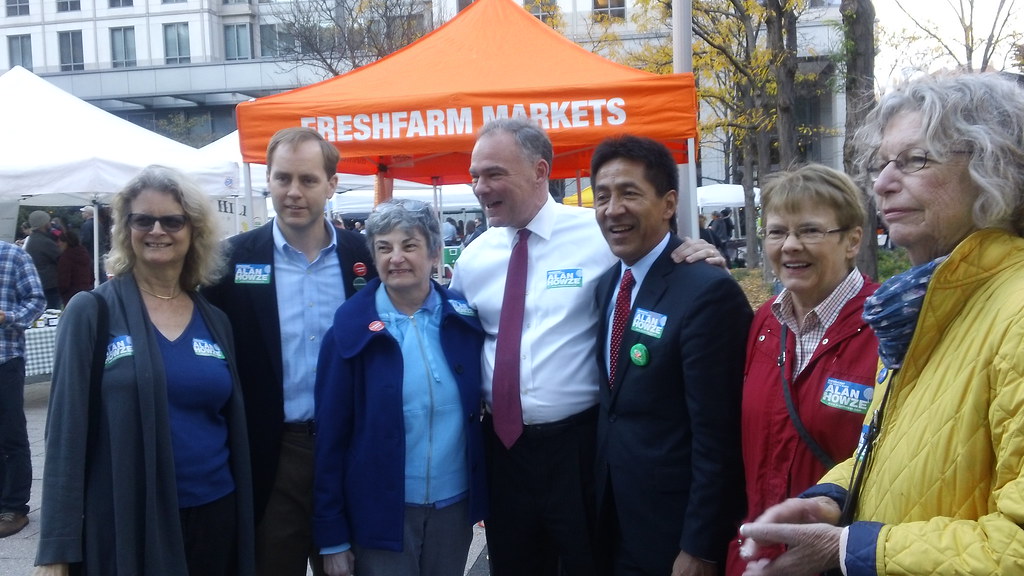 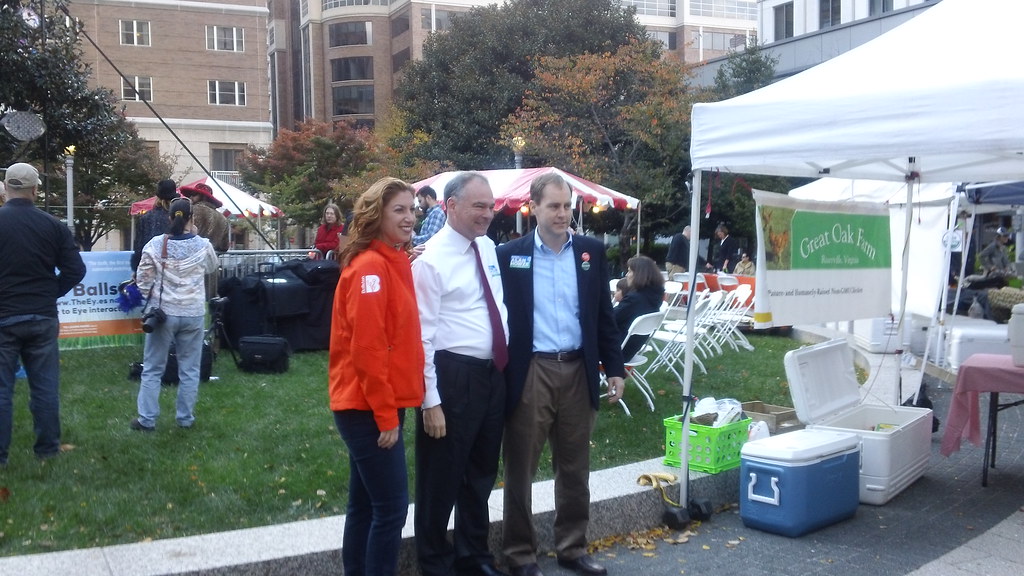 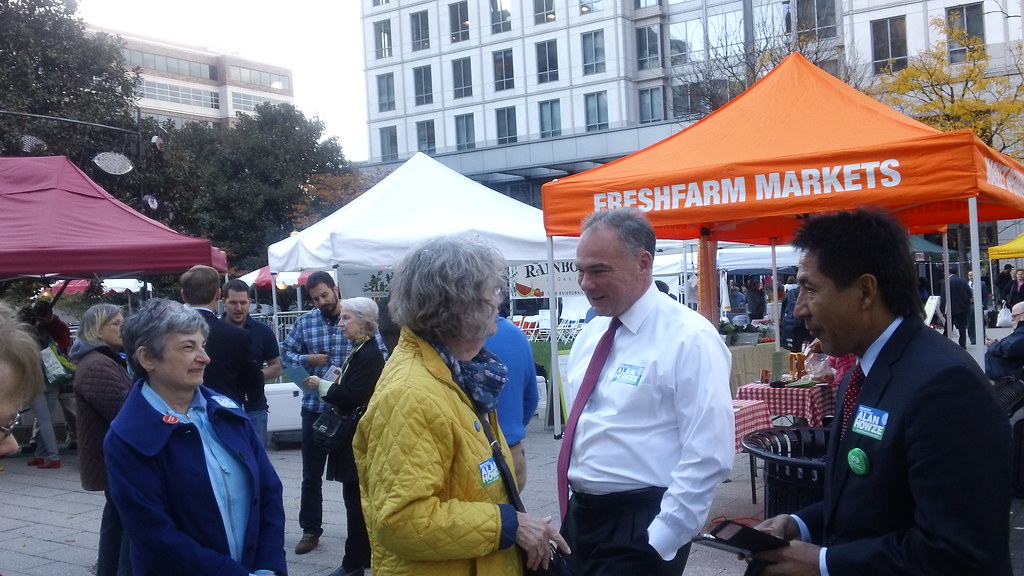 |
Subscribe to:
Posts (Atom)
